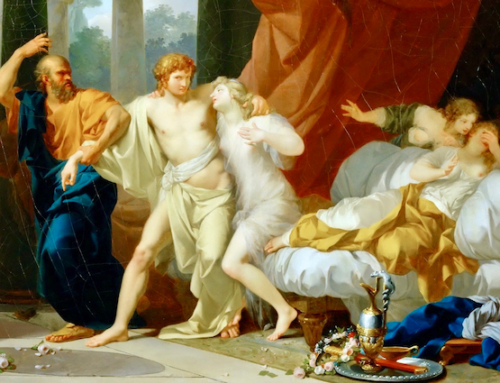 Greek tragedy grew up and was cultivated within the context of religious festival, but these play-festivals of Dionysus, as Paul Cartledge has written in The Cambridge Companion to Greek Tragedy, “served further as a device for defining Athenian civic identity…exploring and confirming but also questioning what it was to be a citizen of a democracy.”
Greek tragedy grew up and was cultivated within the context of religious festival, but these play-festivals of Dionysus, as Paul Cartledge has written in The Cambridge Companion to Greek Tragedy, “served further as a device for defining Athenian civic identity…exploring and confirming but also questioning what it was to be a citizen of a democracy.”
This politically formative dimension of tragedy, and indeed of all “poetry” (i.e. narrative art) and music, is a central theme of Aristotle’s Politics. For Aristotle, as the Aristotelian scholar Stephen Salkever observes, tragedy is the most effective paideia appropriate to the best democracy, the aim of which is the citizen’s cultivation of virtue. We shouldn’t let an academic tendency to approach Greek tragedy primarily as philosophical text to mute the striking nature of this claim. For Aristotle, tragedy and all the mimetic arts fall under the genus of amusements, along with games, circuses, and pageants. Thus Aristotle claims for a kind of entertainment a pivotal political role. As an amusement, tragedy serves as a means of relaxation so that citizens are fortified for further work and virtuous activity. But that it has the potential to serve as more than merely relaxation, that it can help inculcate virtue, becomes clear when we examine how Aristotle understands the immediate impact of tragedy upon its audience.
Whatever its effect, it is implausible to think that tragedy directly instills virtuous dispositions in its spectators. If moral philosophy cannot make us good, it is hard to see how tragedy can do so. So what happens in the heart and mind of a spectator of tragedy?
To ask this question is to ask after the extrinsic ends of tragedy, the effects it produces in its audience. Aristotle in the Poetics identifies two such ends. First of all, in Poetics 4, Aristotle speaks of the universal pleasure humans take in imitation:
“Objects which in themselves we view with pain we delight to contemplate when reproduced with minute fidelity….The cause of this again is, that to learn gives the liveliest pleasure, not only to philosophers but to men in general, whose capacity, however, for learning is more limited.”
This text makes clear that the pleasure found in works of imitation is a cognitive pleasure, the pleasure of contemplation.
Secondly, in Poetics 6, Aristotle speaks of tragedy producing a purgation of the passions of pity and fear. So here are poetry’s two extrinsic ends: one affective, one cognitive. Catharsis and contemplation. As we watch the character Oedipus recognize that he has killed his father and married his mother, we feel pity for what he suffers and we feel fear, if not horror and abhorrence, for what he has done. Our emotional responses to Oedipus, as well as the causes of these responses, are there to be contemplated, not directly acted upon. As Mortimer Adler remarks, “Because art is imitation, the emotions which it creates in the spectator become part of the spectacle, and are thus understood rather than expended in impulse and activity.”
Yet Aristotle speaks of a proper purgation of pity and fear. The passions are not just felt, they are purged, in some sense of that word. On Adler’s reading of Aristotle, purgation refers to the re-ordering of the passions. He contends,
“[J]ust as the passions in every man are in varying stages of violence and uncontrol, so the reason of every man is in varying stages of weakness and undevelopment. It is in this situation, in which all men find themselves, that the arts and other imitations perform their valuable political and moral function.”
Salkever offers an interpretation of Aristotelian katharsis (the “purgation” of pity and fear) by observing how the term is used in Plato. His conclusion agrees with Adler’s precisely. Salkever notices that in Plato katharsis is used, among other ways, to describe the effect on souls of the Socratic dialectic. In this sense, katharsis is more transformation than purgative cleansing, in that it introduces order “into otherwise disorderly or incoherent souls…with the result that involuntary ignorance and tyrannical dreams [dreams of wealth and power] are removed and the educated person becomes better.”
Tragedy, in this view, is analogous to philosophical dialogue; it is a kind of dialectical persuasion intended to bring just order into the soul. Of what truths does tragedy seek to persuade us? From the extant tragedies Salkever culls three over-arching themes, all with a clear political resonance:
“first, that serious mistakes are possible, and one must therefore act with caution; second, that wealth, social prestige, and the power to do whatever we want do not necessarily bring happiness, and one must therefore resist the tendency to identify freedom and happiness with power; third, that the familial order is as fragile as it is precious, and so requires the support of institutions such as the laws if it is to be maintained.”
These are the truths by which tragedy hopes to introduce order into the souls of democratic citizens, a set of truths, certainly, that testify to the enduring relevance of tragedy to democratic government.
While it is too much to say that tragedy accomplishes on its own that psychic re-ordering, it does prepare the ground for it by simulating it—that is, Aristotelian tragedy gives the spectator, in Salkever’s phrase, a new focus of concern. The word “concern” is well chosen, as it captures both the contemplative and the affective element of the experience of tragedy. In a suggestive comparison, Salkever likens the new focus of concern produced by tragedy to the wonder that begins philosophy.
Indeed, in Aristotle’s time as in ours, tragedy and other works of narrative art are, for most people, the customary and most compelling occasions of such philosophical wonder.
The Imaginative Conservative applies the principle of appreciation to the discussion of culture and politics—we approach dialogue with magnanimity rather than with mere civility. Will you help us remain a refreshing oasis in the increasingly contentious arena of modern discourse? Please consider donating now.
The Featured image is by Matthias Süßen, and is licensed under Creative Commons 3.0.







I wonder at times whether tragedy in theatre is still possible, given cynicism and sarcasm are the blood of contemporary popular culture. In Europe, theatre has resorted to brutalism or (at best) a sort of nihilist existentialism as modes of catharsis and socio-political awakening. Tragedy is passe because there is a perception that tragedy is possessed of excess pathos, and pathos elicits laughter rather than soul searching amongst modern viewers. They take nothing seriously, identify “the serious” with “the religious zealot” (Muslim or Christian) and are thus immune to tragedy.
How to change this?
“Tragedy is passe because there is a perception that tragedy is possessed of excess pathos, and pathos elicits laughter…”
I think you have hit the nail on the head here, and this is part of what ticked Nietzsche off so much about Euripides. (And personally I think his critique is essentially sound and still apt today).
I think this article points out nicely how it is best to read Politics and Poetics side by side…..You know, at the end of the day, Aristotle was really pretty good at all this stuff….
Forgive the double post, but current events have given us an ancient Greek tragedy of Roman proportions in our postmodern world:
As if to underline my point, note how popular culture misunderstands Mssr. Venner’s essentially Roman act, perfectly tragic in the Aristotelian sense.
CNN goes so far as to publish an article which casually calls this man who references the Illiad in his suicide note, and whose suicide is remeniscent of Petronius in Quo Vadis… but no, according to the illiterate rabble, he was a “xenophobe” because he understood “citizenship” as distinct from residency or migrant labor.
In any event, the reaction of commentators, gleefully celebrating this tragic death and hoping for more to come demonstrates just how Aristotelian tragedy is utterly powerless in our culture.
http://edition.cnn.com/2013/05/23/opinion/opinion-poirier-same-sex-marriage-suicide/index.html?hpt=hp_t5
http://occamsrazormag.wordpress.com/2013/05/22/translation-of-dominique-venners-suicide-note/
Peter: I’m afraid I missed “the reaction of commentators, gleefully celebrating this tragic death and hoping for more to come”–at least, there was no such reaction in the CNN article to which you linked, or in a New Yorker piece I read (by Judith Thurman) about the incident. However, since suicide is a mortal sin according to the Catholic Church, and Mssr. Venner is therefore now in hell for all eternity, I’m not sure why you’re citing him as some sort of tragic hero–are you suggesting that he died for our sins?
Mr. Shifflet,
1) The CNN article calls hima “xenophobe”. This is a slurr on his character. His last blog entry cites Heidegger. One of his most recent entries cites Machiavelli. In numerous interviews he cites Homer. He was a scholar and clearly a man of ideas who enjoyed open debate and cherished the European heritage. He is labeled a xenophobe for daring to take citizenship seriously. He clearly was not a xenophohe as can be seen from his care to study and respect non-French thinkers. But in our Dark Age, anyone who thinks a nation has the right to self-government and to determine criteria for citizenship and residency is a “xenophobe”.
2) The New Yorker innaccurately labels him a Catholic. He was an atheist. His suicide note makes that clear.
3) If you google his name and read the comments sections in various media, you will find the celebration I refer to. An example is here: http://joemygod.blogspot.com/2013/05/dominique-venners-suicide-note.html Here there is talk of hoping Mr. Buchanan will be next.
3) I cite his act as an example of tragedy as Aristotle understood it because like the fictional Petronous of Quo Vadis, who saw Roman virtue dying around him under Nero, yet was incapable of accepting the new creed of the Apostles and thus chose to die with his beloved Rome, so Venners has chosen to pass symbolically and dramatically just as his beloved France is passing under the strain of American style homogeneity and the massive influx of unassimilated foriegners who are whiping his culture off the map. As for Hell, Pope Francis only yesterday said that atheists are saved and go to Heaven so long as they seek truth. (I recommend the Missio App to keep updated). This is not new, but has been a cornerstone of Catholic teaching. I shall not venture to know this man’s ultimate fate any more than I know anyones, but certainly his gesturs fits this IC post about Aristotelian tragedy as aimed at teaching us about citizenship in a democracy. Certainly Mssr. Venner’s act has announced him to many, like myself, who were unaware of his work and shall now seek it out.
4) As to the accusations of fascism, I will say this: the mass media habitually make no mention of the large cadre of former communists who are now part of Europe’s “democratic family”, for it is understood that the XXth century was a tragic time and forgiveness and solidarity are the order of the day. This ethic is not applied to fascists because of propaganda according to which communism is one of many systems, but fascism is evil. Yet put yourself in the position of young men whose nation has been conquered and who are conscious that a civil war for the future of their continent is being waged. No easy answers present themselves. Americans understand this about their own civil war and abide Linco
n’s calling for “mallice towards none”. The same must apply to Europe’s civil war, but does not because the communists won it, and they believe in “mallice towards all”. Germany was thus blamed for every attrocity, and only recently did the truth come out that things like Katyn were of course Soviet crimes.
Peter: Slurring a man’s character and misidentifying his religion do not constitute “celebration” of his death, nor is “joemygod.blogspot” representative of anyone but himself. You can always find someone who has said something vicious or malicious or mean-spirited or ignorant or cruel on any topic under the sun–that’s what the internet is for!–but it’s hardly fair to rebuke all “commentators” for it (especially since you didn’t name any in your original post). As for Venner’s fate–well, I was actually being tongue-in-cheek, if only because I had never heard of Venner until your comments; but I didn’t say he would go to Hell for being an atheist, I said he was in Hell because he committed suicide. My authority for that is Sister Mary Josephine, who taught me religion at St. Michael School many years ago. (I’m glad to hear, by the way, that Pope Francis thinks I might be saved!)
Regarding fascism, communism, and Europe’s tragic fate: I have nothing to offer, but I did see a survey today that claims that Germany is currently the most admired country in the world–which, as some have noted, is quite a feat of rehabilitation, given the 20th century.
Shouldn’t we say polity, instead of democracy, which in Aristotle is a deviation or perversion of polity?